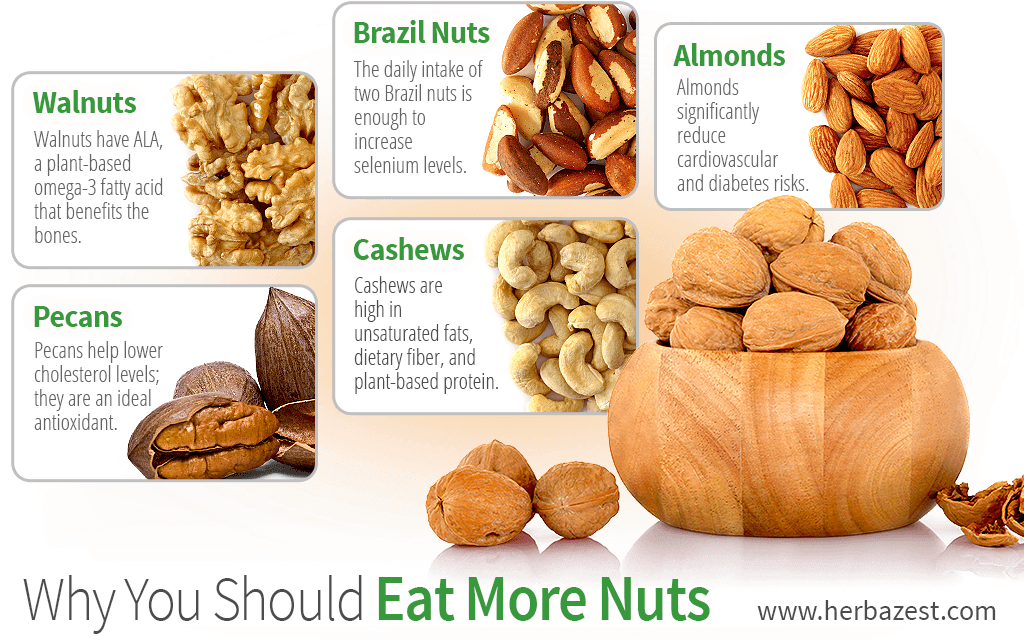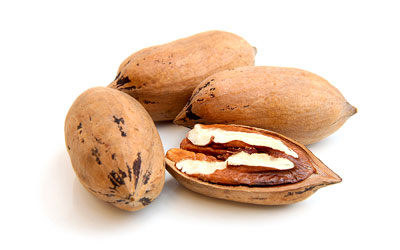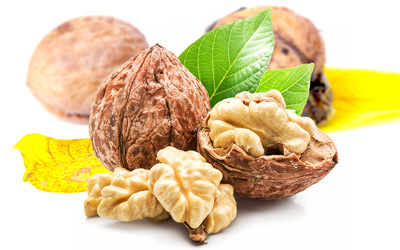If you are among those who avoid nuts because of their high fat content, it's time to change your mind. During the last 10 years, scientific studies have debunked the popular belief that nuts raise cholesterol and lead to obesity. Now, they are highly recommended due to their amount of unsaturated fats and multiple essential nutrients. One important thing about nuts is that they make you feel satisfied with small portions, and eating them as a snack will keep you away from other much more caloric temptations.
1. Pecans
Pecans are among the most nourishing nuts, outshined only by macadamia nuts. They have more than 19 vitamins and minerals, such as vitamin A, vitamin E, calcium, magnesium, phosphorus, potassium, several B vitamins, and zinc. Pecans help lower cholesterol levels, but they also have an important neurological impact. They delay neurodegeneration and improvie motor function, which makes them an ideal antioxidant, anti-aging food for preventing of diseases like amyotrophic lateral sclerosis (ALS), Alzheimer's, and Parkinson's disease.
2. Walnuts
Walnuts are the only type of nut that offers large doses of alpha-linolenic acid (ALA), a plant-based omega-3 fatty acid. One single ounce of walnuts a day delivers more than 100% of the suggested dose for an adult. According to scientific research, a diet high in ALA effectively protects your bones. Thanks to their ALA content and phenols, walnuts may have more anti-inflammatory qualities than other nuts. In addition, they have zero saturated fat or sodium, which makes them a great option to regulate cholesterol levels.
Additionally, walnuts' rich content of polyunsaturated fatty acids (PUFAs) may help in preventing arterial obstruction. A study has shown that adding walnuts to a healthy diet improves vasodilatation in type 2 diabetic patients, suggesting a potential reduction in overall cardiac risk.
3. Brazil Nuts
Brazil nuts are among the most caloric nuts. However, they have plenty of nutrients and offer important health benefits. In spite of a low content of protein and vitamins (mainly folate and choline), Brazil nuts are especially charged with selenium, a trace mineral that isn't produced by the body and needs to be ingested in small doses through food.
Selenium influences hormonal activity and neurotransmitters in the brain, affecting moods in humans and behavior in animals. Moderate consumption of selenium not only defuses the neurotoxicity of metals, but also helps prevent loss of brain function caused by aging. A study found that the daily intake of two Brazil nuts is enough to increase selenium levels.
4. Almonds
Almonds are among the less caloric nuts and show high levels of protein as well as antioxidants, especially vitamin E. Because of their unique composition, almonds are likely to significantly reduce cardiovascular and diabetes risks, such as obesity, glucose homeostasis, inflammation, and oxidative stress. Eating almonds will also increase your levels of magnesium, a mineral that plays a key role in producing energy, controlling muscle contractions, and building stronger bones.
5. Cashews
Cashews are highly nutritious and provide a substantial amount of energy. These delicious nuts have a high content of unsaturated fats, dietary fiber, and proteins. They also have vitamins that are essential for the body. Cashews' mono- and polyunsaturated fats significantly decrease cholesterol levels as well as reduce the risk of cardiovascular disease, stroke, metabolic syndrome, and diabetes.
Most nuts are easy to find and can be eaten raw as a snack or as an addition to salads, trail mixes, main courses, and desserts. As part of a healthy diet, nuts can provide lots of energy. Munch on some nuts during the day, and you will see overall improvements in no time at all.
Sources
- American Journal of Epidemiology, Selenium Level and Cognitive Function in Rural Elderly Chinese, 2007
- Diabetes Care, Effects of Walnut Consumption on Endothelial Function in Type 2 Diabetic Subjects, 2009
- Journal of Neurochemistry, Selenium and selenoproteins in the brain and brain diseases, 2003
- Nutritional Neuroscience, Selenium and the brain: a review, 2001
- University of Michigan Health, Healthy Nuts
- MedlinePlus Herbs and Supplements, Selenium in diet
- American Journal of Clinical Nutrition, Brazil nuts: an effective way to improve selenium status, 2008
- Journal of Agricultural and Food Chemistry, Health benefits of almonds beyond cholesterol reduction, 2012









